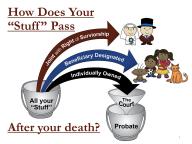|
Wednesday, December 7, 2022
 We are now living in “The Sandwich Generation” era. The Sandwich Generation refers to those caregivers, generally between the ages of 45 and 59, who are caring for aging parents while also caring for young children or dependent young adult children. One of the issues facing many of those caregivers is how to pay for the aging parent’s long-term care needs. Long-term care refers to ongoing assistance to meet some of the basic activities of daily living, such as bathing, eating, dressing, using the toilet, transferring from bed or chair, caring for incontinence or eating. The type and cost of long-term care depends on the services necessary for the health and safety of the person.
Read more . . .
Tuesday, October 4, 2022
 I just got back from a trip to the beach where there were back-to-back weddings near the ocean. So many new brides and grooms! Are you planning to get married or divorced in the near future? How will that affect your estate plan?
An estate plan has lots of pieces and moving parts, but let’s start with how marriage and divorce affect the basic legal documents you should have in your estate plan.
WHAT HAPPENS TO MY OLD WILL?
If you marry after signing a will and you have not specifically stated in the document that you are executing the will in anticipation of a future marriage, that will signed previous to marriage will not be valid. If you then die without executing a new will, you will die intestate and the rules of the state of Georgia will control distribution of your assets. That means that if you have a wife and children, your new spouse will share the assets in your probate estate with your children. Read more . . .
Tuesday, October 4, 2022
 For many of you, the bulk of the estate ("stuff") that you will be passing on to your loved ones is controlled not by your will, a trust or the probate court, but by the beneficiaries you designated on forms filed with financial institutions. 401(k)'s, IRAs, and Life Insurance policies will be distributed at your death based on whom you have chosen as a beneficiary. Based on my conversations with clients, I'm betting that many of you have not checked those designations in a very long time - if ever. What can happen if you name the wrong beneficiary or No beneficiary?First, let's talk about what may happen if you name no beneficiary. If you do not name a beneficiary for a life insurance policy, after your death an estate will have to be opened to receive the money from that policy. Read more . . .
Wednesday, June 22, 2022
7243.jpg) ABLE (Achieving a Better Life Experience) accounts offer people with disabilities a great, tax-free way to accumulate money without jeopardizing their qualifications for Supplemental Security Income (SSI) and other means-tested programs. Withdrawals are tax-free as long as the money is used for “qualified disability expenses.” The arguments for starting and maintaining such funds are overwhelming, not least of which is the wide variety of things on which the money can be spent. To build 529A ABLE accounts, beneficiaries (and other contributors) can put up to $16,000 total into these funds each year. Read more . . .
Monday, June 6, 2022
Writing Instructions to Potential Guardians If you have minor children, or children with disabilities, the thought of leaving them suddenly is unimaginable. Parents know their children- their schedules, their health, their likes and dislikes- but keep most of that knowledge in their heads. When my kids were growing up, I knew when they needed to be at soccer practice and church, who their doctor was and how to reach her, and how to tell when they were sick. Other than abbreviations on my calendar and names in my database, there was no formal written schedule of activities or list of important contacts. Most parents can’t imagine how someone would be able to step in and take care of their children. Read more . . .
Friday, April 8, 2022
 Last month, we introduced our year-long project to organize our estates. How did you do? Did you check all the boxes? As with most projects, sometimes getting started is the real goal, so give yourself a gold checkmark if you did anything to start getting your estate in order. This month, it is time to make sure we have legal documents in place to protect in case we become unable to make or communicate significant decisions about our healthcare or our finances. Years ago, I had a potential client whose daughter called my office several times to make appointments for him to get his estate planning documents prepared. As each appointment time approached, he called my office to cancel.
Read more . . .
Thursday, March 31, 2022
What is a financial power of attorney? A Financial Power of Attorney is a document in which you nominate someone to make financial decisions for you. When you appoint someone to make those financial decisions, you are called the Principal. The person you nominate to act on your behalf is called an Agent. A Financial Power of Attorney can be used for a one-time transaction, such as selling or buying a house, or it can be a durable financial power of attorney written to allow broad powers that can be used for many types of financial transactions for many years. The term “Durable” in this case means the Financial Power of Attorney remains in effect even if you, the Principal, become mentally incapacitated. Read more . . .
Wednesday, February 10, 2021
 What should you do when a loved one dies? How and when does the estate get administered? Administration is defined as Court-supervised distribution of an estate during probate. Also used to describe distribution process for a trust. Probate means proving the will, but it can also be used to indicate a court process to handle a deceased person’s estate. When a loved one dies, there is often confusion and panic about what legal and financial steps should be taken by survivors. There may be little information about the finances of the decedent, and spouses or children are left to sort through what may seem like a never-ending mass of papers. Read more . . .
Monday, December 28, 2020
 An heir is the person or persons who are related by blood that would inherit from a decedent ( a person who has died) if the decedent had no will. An heir is the person or persons who are related by blood that would inherit from a decedent ( a person who has died) if the decedent had no will.
A beneficiary is a person (or charity or institution) named in a will to whom the decedent wishes to leave his or her assets at the time of death.
Who are your heirs? Take your wrist and place two fingers on your other hand and place them on your wrist. Do you feel a pulse? If so, you don’t yet have any heirs. That is kind of a snarky way to explain that we cannot know who your heirs are until you are dead.Read more . . .
Friday, February 7, 2020
 My favorite hobby is reading and I try to combine my love of reading with my profession of estate planning. The plots of some of my favorite books are about dysfunctional family relationships complicated by really bad estate planning!Here are three books I recommend where siblings were torn apart by their parents’ bad estate planning choices.The Nestby Cynthia D’Aprix SweeneyThe four siblings of the Plumb family - Leo, Melody, Beatrice, and Jack- are the beneficiaries of a trust fund they call “The Nest” left to them by their father. The terms of the trust provide that the trust assets will be distributed equally to the four siblings when the youngest, Melody, reaches age 40. When the book begins, Melody is fast-approaching her 40th birthday, and each of the siblings is anxiously awaiting the distribution that could solve their self-inflicted life problems.
Read more . . .
Wednesday, December 4, 2019
 Happy Holidays! Is It Time to Have a Conversation About Long-term Care with an Aging Parent?Like many families, mine is scattered all over the United States. Work and other commitments make it difficult to visit distant loved ones more than a few times a year. When visiting, it is hard to gauge the health and safety of family members because they are often not going about their normal daily activities. A few years ago, while visiting my dad in Oregon, I noticed that there was something not quite right with him. He was repeating himself and telling stories about his history that I was pretty sure were not true.Read more . . .
The Elrod-Hill Law Firm,LLC assists clients with Estate Planning, Veterans Benefits, Medicaid, Elder Care Law, Probate, Special Needs Planning and Pet Trusts in the North Atlanta area including the counties of Dekalb, Gwinnett and Fulton.
|

|
|
|